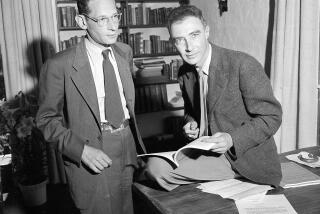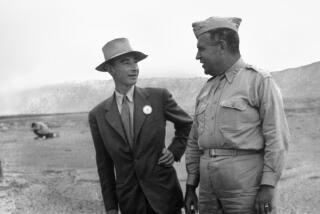Melba Phillips, 97; Physicist Helped Teach Science Education
Melba Phillips, 97, a physicist who worked with J. Robert Oppenheimer and was a pioneer in developing science education, died Nov. 8 in a Petersburg, Ind., nursing home of natural causes.
After earning a doctorate at UC Berkeley, Phillips worked with Oppenheimer in the mid-1930s to explain unexpected reactions of various kinds of subatomic particles. Their findings, known as the Oppenheimer-Phillips effect, is considered classic in early nuclear physics. In the 1940s, as Oppenheimer led the development of the atomic bomb, Phillips helped organize the Federation of American Scientists, which later helped assure civilian control of atomic energy.
Primarily an educator, Phillips developed training for teaching physics, led an effort to improve the preparation of physics teachers, and helped write two textbooks. In 1966, she became the first woman president of the American Assn. of Physics Teachers and later received the first Melba Newell Phillips Award, created in her honor.
In the 1950s, she was thrown out of jobs at Brooklyn College and the Columbia University Radiation Laboratory because she refused to testify before a Senate subcommittee investigating accusations of Communist activities. After McCarthyism waned, she helped direct a teacher-training institute at Washington University. She joined the University of Chicago faculty in 1962.






